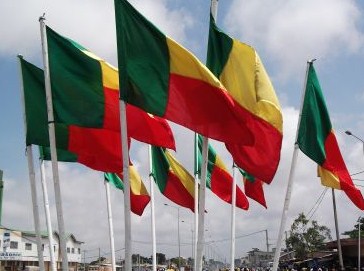36 candidates for one presidential seat
BY MODUPE ABIOLA
(REPORTING BY LOU SIFA; EDITING BY JIBRIL TURE)
Cotonou, Benin—The people of the small French-speaking West African nation of Benin are expected to go to the polls on February 28 to elect a new president. If no candidate receives 50% plus one votes on that day, there will be a run-off two weeks later.
The Beninese voters cannot complain about the lack of would-be-presidents. They are blessed with a large pool of 37 candidates, down from the initial 52 after four have been deemed unqualified and 11 others proved unable to pay the 15 million cfa francs (just under $25,000) required to put their names on the ballots. This translates to one candidate for about every 270,000 citizens of the total population of 10 million or so.
Politics is like a national sport in Benin. The small, poor nation was widely recognized as the flagship of African democracy in the early 1990s. Following the historic “national conference of the living forces of the nation” convened in February 1990 by then-president Mathieu Kérékou in the face of recurring mass protests to debate the future of the nation, the country adopted a new constitution. New elections held a year later ushered in a new era when Nicéphore Soglo, a World Bank administrator, after serving one year as transitional prime minister while some of the new institutions of the Republic were being formed, was elected president. Many other West and Central African heads of state, pressured by their people, convened their own national conferences, but rarely with the results achieved in Benin where fundamental liberties and checks and balances were truly protected, not just written in the Constitution. The country stayed the course over the years, despite some setbacks during both the Soglo and the Kérékou administrations for fifteen years, earning praises as well as a shower of aid by donor nations as a reward for the country’s stride toward democracy.
You may also want to read this update: Benin upcoming election clouded by fear
Despite wide claims by part of the local press and some influential members of the civil society that democracy has receded under the rule of the current president, Yayi Boni, many indicators—including the vibrant freedom of expression and opinion—attest to the vitality of democracy here.
While the long list of candidates for the February 28 election comprises a good dozen high-profile personalities such as former IMF director for Africa and former president of the West African Development Bank, Abdoulaye Bio Tchané, and a bunch of “I also rans,” it is widely believed that the winner will come out of a short list of three front-runners: Lionel Zinsou, 62, prime minister since June 2015, who is running under the banner of out-going president Yayi Boni’s political party, the Cowrie Forces for an Emerging Benin (FCBE); Sébastien Ajavon, 50, supposedly the wealthiest businessman in the country; and Patrice Talon, 57, also a wealthy entrepreneur. However, given that opinion polls are not conducted in Benin in the context of elections, this prediction has much less of a scientific value than, say, in the U.S.
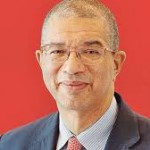
Benin is the only country in the West African sub-region that can boast a non-violent political history since becoming independent from France in 1960—despite having experienced several coups—but the small country is one of the most politically-complex ones, where political intrigues, controversies and a passion for conspiracy theories are usually the norm.
Late last year, after the end of the year-long political war triggered by President Yayi’s presumed—not proven—plans to change the Constitution to remain in power beyond his second and last legal term, the outgoing president’s party named prime minister Lionel Zinsou as its candidate to contest the election. Zinsou, born in Paris, is the son of a famous Beninese doctor and a (white) French mother. A graduate of fine European schools, he taught at the French elite school Ecole Normale Supérieure. His track record includes the high-profile position of advisor to former French prime minister Laurent Fabius, and being an investment banker.
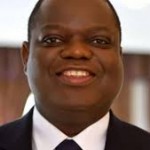
Typically, several members of the president’s party—some of whom were dreaming of replacing him—protested the choice and pledged their support for other candidates. Former president Nicephore Soglo, who is no political ally of Yayi—though the current president owes his very ascend in politics to Soglo—was the first local political heavyweight who publicly embraced the choice of Zinsou—or at least it appeared that way. Soglo, the former World Bank administrator who won the presidency in 1991 and rescued Benin from bankruptcy stemming from 17 years of Marxist dictatorship, had nothing but praises for Zinsou after hosting him at his residence on November 25: “He possesses the tools necessary to help this country go forward,” Soglo said. But the former president took everyone by surprise with a 180-degree turn less than two weeks later, on December 7, when he denounced the choice of Zinsou as a way for France, the former colonizer, to “recolonize” Benin in the name of the so-called Foccart doctrine which he defined as “France imposing on the African people the leaders of its choice.” He added, emphatically, “as long as I am around, that will not happen.”
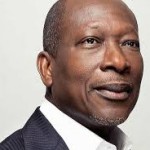
That, however, did not stop Zinsou’s candidacy from being endorsed by two of the major political parties in Benin, the Democratic Renewal Party (PRD) of the speaker of the parliament and former presidential candidate Adrien Houngbédji, and the very party former president Soglo is the honorary president of, the Benin Rebirth Party (RB) (founded in 1994 by his wife and veteran lawmaker, Rosine Soglo,) now headed by the presidential couple’s oldest son, Lehady Soglo, currently the mayor of Cotonou in replacement of his father. This development did not appear to shock the people of Benin who are accustomed to such bizarre public disagreements in the family, despite the former president’s barely-contained anger upon hearing the news of the RB’s endorsement of Zinsou, calling it “a provocation,” and saying in public about his son: “One wonders if he has been bewitched.”
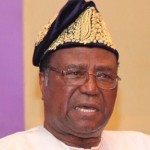
The endorsement of Zinsou’s candidacy by the PRD not only surprised many—given the longstanding political rivalry between President Yayi Boni and PRD’s founder and president, Adrien Houngbédji; it literally irritated Ajavon, one of the two other leading contenders, who took to the airwaves to voice his “bitter disappointment” and recalled his unwavering support—including his material assistance—that, he said, has helped Houngbédji win the speaker’s position. Despite PRD’s official endorsement, several leading members of this party, including one of its vice presidents, have refused to toe the party’s line and decided to embrace other candidates.
It is estimated that the three parties supporting the candidacy of the prime minister represent about 50% of the electorate, which can tip the balance in Zinsou’s favor during the first round, what is known here as k.o. (which carries a connotation of possible irregularities). This prospect has prompted nine political parties to form an alliance to prevent the k.o.
Ajavon’s own candidacy and that of the other billionaire in the race don’t sit too well with a fraction—though a small one—of the civil society who feels, as does the Benin clergy in a more subtle way, that businessmen have no place in politics. Clearly a model of democracy unlike that of the United States where, historically, entrepreneurs such as Jimmy Carter, the Bushes, and now Donald Trump, have been very welcome in the political arena.
Unlike the United States where the race for the White House started more than a year before the November 2016 election day, the would-be-presidents in Benin will have only two weeks from the election date of February 28 to campaign. Many of them, therefore, are still honing their message.


